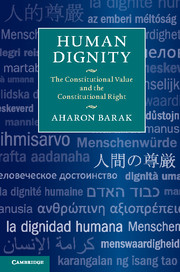Book contents
- Frontmatter
- Contents
- Preface
- Acknowledgements
- Table of Cases
- Part I Fundamental concepts and sources
- Part II Human dignity as a constitutional value
- Part III Human dignity as a constitutional right
- Part IV Human dignity in comparative law
- 11 Human dignity in American constitutional law
- 12 Human dignity in Canadian constitutional law
- 13 Human dignity in German constitutional law
- 14 Human dignity in South African constitutional law
- 15 Human dignity in Israeli constitutional law
- Bibliography
- Index
- References
15 - Human dignity in Israeli constitutional law
Published online by Cambridge University Press: 05 February 2015
- Frontmatter
- Contents
- Preface
- Acknowledgements
- Table of Cases
- Part I Fundamental concepts and sources
- Part II Human dignity as a constitutional value
- Part III Human dignity as a constitutional right
- Part IV Human dignity in comparative law
- 11 Human dignity in American constitutional law
- 12 Human dignity in Canadian constitutional law
- 13 Human dignity in German constitutional law
- 14 Human dignity in South African constitutional law
- 15 Human dignity in Israeli constitutional law
- Bibliography
- Index
- References
Summary
Articles 2 and 4 of the Basic Law
Articles 2 and 4 of Basic Law: Human Dignity and Liberty recognize human dignity as a constitutional right. Section 2 of the Basic Law states:
The life, body, or dignity of a person, as a human being, is not to be limited.
Article 4 of the Basic Law adds:
Every person is entitled to protection of his life, his body and his dignity.
These articles have undergone comprehensive judicial interpretation. They have been employed by scores of judgments in various areas of law. These judgments share the approach that human dignity is not solely a constitutional value. It is also a constitutional right. The Israeli Supreme Court discussed this in one case:
[T]he Basic Law does not merely declare “policy” or “ideals” (cf. art. 20(1) of the Basic Law of Germany). The Basic Law does not merely delineate a “plan of operation” or a “purpose” for the organs of government (cf. art. 27(2) of the constitution of South Africa; art. 39 of the constitution of India). It does not merely provide an “umbrella concept” with interpretive application … Sections 2 and 4 of the Basic Law provide a right – a right that guarantees human dignity. This right corresponds with the duty of the organs of government to respect it (s. 11).
Basic Law: Human Dignity and Liberty recognizes a number of independent freestanding constitutional rights. In addition to these is the constitutional right to engage in any occupation, profession or trade (freedom of occupation), which is enshrined in Basic Law: Freedom of Occupation. The rights determined in these two Basic Laws do not comprise the comprehensive list of the constitutional rights in Israel. The other Basic Laws also contain constitutional rights. Thus, for example, Basic Law: The Knesset contains provisions regarding the right to vote and run for office. The provisions on this matter are not considered merely “institutional,” but rather grant election rights pursuant to the conditions set out in the provisions, such as equality. Another example is the provision in Basic Law: The Judiciary, according to which “[a] court shall sit in public.” This is not only an institutional provision, but also an individual right for which there is a corresponding state duty. All these constitutional rights are at an equal constitutional level.
- Type
- Chapter
- Information
- Human DignityThe Constitutional Value and the Constitutional Right, pp. 280 - 307Publisher: Cambridge University PressPrint publication year: 2015



